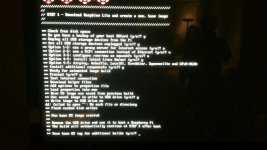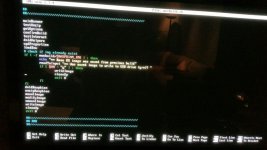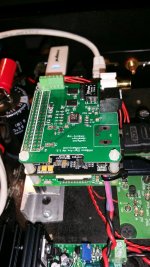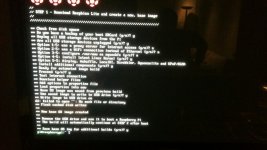Moode Audio with old RasPi1
Hi all,
I'm new to Moode Audio and try to use it on old RasPi1.
First I made an image with RasPi3 and works fine on it, but the image can't play music on RasPi1. OS boot and I can access via Web UI, but when touch the play button to play it halts. RasPi1 seems down because ssh connections are lost and no ping replies.
Second, I tried to make image on RasPi1 because I think some components are not compatilble with old RasPi1.
But mosbuild.sh script stops after reboot at "Failed: Failed to /etc/rc.local Comatibility".
Here's the script log:
pi@moode:~ $ cat mosbuild.log
** Fri 15 Dec 16:22:26 UTC 2017
////////////////////////////////////////////////////////////////
//
// STEP 2 - Expand the root partition to 3GB
//
////////////////////////////////////////////////////////////////
** Change password for user pi to moodeaudio
** Download latest moOde release
** Unzip release
** Expand SDCard to 3GB
Welcome to fdisk (util-linux 2.29.2).
Changes will remain in memory only, until you decide to write them.
Be careful before using the write command.
Command (m for help): Disk /dev/mmcblk0: 7.4 GiB, 7948206080 bytes, 15523840 sectors
Units: sectors of 1 * 512 = 512 bytes
Sector size (logical/physical): 512 bytes / 512 bytes
I/O size (minimum/optimal): 512 bytes / 512 bytes
Disklabel type: dos
Disk identifier: 0x37665771
Device Boot Start End Sectors Size Id Type
/dev/mmcblk0p1 8192 93236 85045 41.5M c W95 FAT32 (LBA)
/dev/mmcblk0p2 94208 3629055 3534848 1.7G 83 Linux
Command (m for help): Partition number (1,2, default 2):
Partition 2 has been deleted.
Command (m for help): Partition type
p primary (1 primary, 0 extended, 3 free)
e extended (container for logical partitions)
Select (default p): Partition number (2-4, default 2): First sector (2048-15523839, default 2048): Last sector, +sectors or +size{K,M,G,T,P} (94208-15523839, default 15523839):
Created a new partition 2 of type 'Linux' and of size 3 GiB.
Partition #2 contains a ext4 signature.
Command (m for help):
Disk /dev/mmcblk0: 7.4 GiB, 7948206080 bytes, 15523840 sectors
Units: sectors of 1 * 512 = 512 bytes
Sector size (logical/physical): 512 bytes / 512 bytes
I/O size (minimum/optimal): 512 bytes / 512 bytes
Disklabel type: dos
Disk identifier: 0x37665771
Device Boot Start End Sectors Size Id Type
/dev/mmcblk0p1 8192 93236 85045 41.5M c W95 FAT32 (LBA)
/dev/mmcblk0p2 94208 6238207 6144000 3G 83 Linux
Command (m for help): The partition table has been altered.
Calling ioctl() to re-read partition table.
Re-reading the partition table failed.: Device or resource busy
The kernel still uses the old table. The new table will be used at the next reboot or after you run partprobe(8) or kpartx(8).
Root partition has been resized
The file system will be enlarged after reboot
SYSTEMD 1
BOOT_DEV mmcblk0
ROOT_PART mmcblk0p2
PART_NUM 2
LAST_PART_NUM 2
PART_START 94208
PART_END +3000M
** Install boot/config.txt
** Cleanup
** Reboot 1
** Sun 17 Dec 10:17:56 UTC 2017
////////////////////////////////////////////////////////////////
//
// STEP 3A - Install core packages
//
////////////////////////////////////////////////////////////////
** Basic optimizations
Synchronizing state of cron.service with SysV service script with /lib/systemd/systemd-sysv-install.
Executing: /lib/systemd/systemd-sysv-install disable cron
Synchronizing state of rpcbind.service with SysV service script with /lib/systemd/systemd-sysv-install.
Executing: /lib/systemd/systemd-sysv-install enable rpcbind
Created symlink /etc/systemd/system/sockets.target.wants/rpcbind.socket → /lib/systemd/system/rpcbind.socket.
E: Could not get lock /var/lib/dpkg/lock - open (11: Resource temporarily unavailable)
E: Unable to lock the administration directory (/var/lib/dpkg/), is another process using it?
** Error: unable to purge triggerhappy
** Image build cancelled
/etc/rc.local: 21: /etc/rc.local: /home/pi/mosbuild/mosbuild_worker.sh: not found
/etc/rc.local: 21: /etc/rc.local: /home/pi/mosbuild/mosbuild_worker.sh: not found
Hi all,
I'm new to Moode Audio and try to use it on old RasPi1.
First I made an image with RasPi3 and works fine on it, but the image can't play music on RasPi1. OS boot and I can access via Web UI, but when touch the play button to play it halts. RasPi1 seems down because ssh connections are lost and no ping replies.
Second, I tried to make image on RasPi1 because I think some components are not compatilble with old RasPi1.
But mosbuild.sh script stops after reboot at "Failed: Failed to /etc/rc.local Comatibility".
Here's the script log:
pi@moode:~ $ cat mosbuild.log
** Fri 15 Dec 16:22:26 UTC 2017
////////////////////////////////////////////////////////////////
//
// STEP 2 - Expand the root partition to 3GB
//
////////////////////////////////////////////////////////////////
** Change password for user pi to moodeaudio
** Download latest moOde release
** Unzip release
** Expand SDCard to 3GB
Welcome to fdisk (util-linux 2.29.2).
Changes will remain in memory only, until you decide to write them.
Be careful before using the write command.
Command (m for help): Disk /dev/mmcblk0: 7.4 GiB, 7948206080 bytes, 15523840 sectors
Units: sectors of 1 * 512 = 512 bytes
Sector size (logical/physical): 512 bytes / 512 bytes
I/O size (minimum/optimal): 512 bytes / 512 bytes
Disklabel type: dos
Disk identifier: 0x37665771
Device Boot Start End Sectors Size Id Type
/dev/mmcblk0p1 8192 93236 85045 41.5M c W95 FAT32 (LBA)
/dev/mmcblk0p2 94208 3629055 3534848 1.7G 83 Linux
Command (m for help): Partition number (1,2, default 2):
Partition 2 has been deleted.
Command (m for help): Partition type
p primary (1 primary, 0 extended, 3 free)
e extended (container for logical partitions)
Select (default p): Partition number (2-4, default 2): First sector (2048-15523839, default 2048): Last sector, +sectors or +size{K,M,G,T,P} (94208-15523839, default 15523839):
Created a new partition 2 of type 'Linux' and of size 3 GiB.
Partition #2 contains a ext4 signature.
Command (m for help):
Disk /dev/mmcblk0: 7.4 GiB, 7948206080 bytes, 15523840 sectors
Units: sectors of 1 * 512 = 512 bytes
Sector size (logical/physical): 512 bytes / 512 bytes
I/O size (minimum/optimal): 512 bytes / 512 bytes
Disklabel type: dos
Disk identifier: 0x37665771
Device Boot Start End Sectors Size Id Type
/dev/mmcblk0p1 8192 93236 85045 41.5M c W95 FAT32 (LBA)
/dev/mmcblk0p2 94208 6238207 6144000 3G 83 Linux
Command (m for help): The partition table has been altered.
Calling ioctl() to re-read partition table.
Re-reading the partition table failed.: Device or resource busy
The kernel still uses the old table. The new table will be used at the next reboot or after you run partprobe(8) or kpartx(8).
Root partition has been resized
The file system will be enlarged after reboot
SYSTEMD 1
BOOT_DEV mmcblk0
ROOT_PART mmcblk0p2
PART_NUM 2
LAST_PART_NUM 2
PART_START 94208
PART_END +3000M
** Install boot/config.txt
** Cleanup
** Reboot 1
** Sun 17 Dec 10:17:56 UTC 2017
////////////////////////////////////////////////////////////////
//
// STEP 3A - Install core packages
//
////////////////////////////////////////////////////////////////
** Basic optimizations
Synchronizing state of cron.service with SysV service script with /lib/systemd/systemd-sysv-install.
Executing: /lib/systemd/systemd-sysv-install disable cron
Synchronizing state of rpcbind.service with SysV service script with /lib/systemd/systemd-sysv-install.
Executing: /lib/systemd/systemd-sysv-install enable rpcbind
Created symlink /etc/systemd/system/sockets.target.wants/rpcbind.socket → /lib/systemd/system/rpcbind.socket.
E: Could not get lock /var/lib/dpkg/lock - open (11: Resource temporarily unavailable)
E: Unable to lock the administration directory (/var/lib/dpkg/), is another process using it?
** Error: unable to purge triggerhappy
** Image build cancelled
/etc/rc.local: 21: /etc/rc.local: /home/pi/mosbuild/mosbuild_worker.sh: not found
/etc/rc.local: 21: /etc/rc.local: /home/pi/mosbuild/mosbuild_worker.sh: not found
Make sure that the usb card reader is not read only, if you can format the card you are good to go
Hi
Are you using one of those multi-card readers. I had that issue before the suggested changes by @koda59. I am not sure if they were incorporated into the latest mosbuild.sh file.
Try and get a dedicated USB/MicroSD Card reader.
I usually use the SDCard Formatter app but have also formatted cards with Windows and never had an instance where that was the issue where the card could not be seen.
I've been using a dedicated USB Micro SD Card Reader, it came with a drone that I bought a couple of months back. Will look at getting another one to try withI have used a multi-card reader and dedicated sdcard USB reader.
Insignia[emoji769] - USB 3.0 Memory Card Reader from Best Buy $15
Rocketek Aluminum USB 3.0 Portable Memory Card Reader Adapter for Micro SD Card / TF Card Reader Adapter from Amazon $9.
Both worked for me, but seems others prefer the dedicated USB 3.0 adapter.
Hope this helps.
Cheers, have found @HeeBoo posts, will give this is a try later@cjward23
If you look at the posts by @HeeBoo you will see that he adapted the build so that it could be done with a single SD card, in the RPi. It avoids potential problems with USB card readers.
Stream from Pi to Apple Airport Express.
Hi Tim,
I very love your software and try to install Moode 4.12 beta. But I have an Apple Airport Express (AE), now how can I connect my Pi 3 to AE to stream music, I can not find this funtion on Moode. Last time, I use Macbook to stream music to AE.
Thanks a lot.
Hi Tim,
I very love your software and try to install Moode 4.12 beta. But I have an Apple Airport Express (AE), now how can I connect my Pi 3 to AE to stream music, I can not find this funtion on Moode. Last time, I use Macbook to stream music to AE.
Thanks a lot.
Hi Tim,
I very love your software and try to install Moode 4.12 beta. But I have an Apple Airport Express (AE), now how can I connect my Pi 3 to AE to stream music, I can not find this funtion on Moode. Last time, I use Macbook to stream music to AE.
Thanks a lot.
Moode doesn’t stream to airport devices, it accepts streams from them.
The APE is output only, so you can’t connect your Moode player as an analog out, either.
Good afternoon,
I've been running Moode plus USB DAC and Moode plus Kali/Piano DAC for a long time.
Now I would like to try Kali plus a TDA1541 i2s DAC. I tried some setups, unsuccessful so far.
Any idea which setup I should choose?
Best
Ernst
Hi Ernst,
I've been running MoOde with Pi2, Kali and TDA1541 with no problems. Double check your connections and your I2S lines are shielded and short as possible.
Simon
Hi all,
I'm new to Moode Audio and try to use it on old RasPi1.
First I made an image with RasPi3 and works fine on it, but the image can't play music on RasPi1. OS boot and I can access via Web UI, but when touch the play button to play it halts. RasPi1 seems down because ssh connections are lost and no ping replies.
Second, I tried to make image on RasPi1 because I think some components are not compatilble with old RasPi1.
But mosbuild.sh script stops after reboot at "Failed: Failed to /etc/rc.local Comatibility".
Here's the script log:
pi@moode:~ $ cat mosbuild.log
** Fri 15 Dec 16:22:26 UTC 2017
////////////////////////////////////////////////////////////////
//
// STEP 2 - Expand the root partition to 3GB
//
////////////////////////////////////////////////////////////////
** Change password for user pi to moodeaudio
** Download latest moOde release
** Unzip release
** Expand SDCard to 3GB
Welcome to fdisk (util-linux 2.29.2).
Changes will remain in memory only, until you decide to write them.
Be careful before using the write command.
Command (m for help): Disk /dev/mmcblk0: 7.4 GiB, 7948206080 bytes, 15523840 sectors
Units: sectors of 1 * 512 = 512 bytes
Sector size (logical/physical): 512 bytes / 512 bytes
I/O size (minimum/optimal): 512 bytes / 512 bytes
Disklabel type: dos
Disk identifier: 0x37665771
Device Boot Start End Sectors Size Id Type
/dev/mmcblk0p1 8192 93236 85045 41.5M c W95 FAT32 (LBA)
/dev/mmcblk0p2 94208 3629055 3534848 1.7G 83 Linux
Command (m for help): Partition number (1,2, default 2):
Partition 2 has been deleted.
Command (m for help): Partition type
p primary (1 primary, 0 extended, 3 free)
e extended (container for logical partitions)
Select (default p): Partition number (2-4, default 2): First sector (2048-15523839, default 2048): Last sector, +sectors or +size{K,M,G,T,P} (94208-15523839, default 15523839):
Created a new partition 2 of type 'Linux' and of size 3 GiB.
Partition #2 contains a ext4 signature.
Command (m for help):
Disk /dev/mmcblk0: 7.4 GiB, 7948206080 bytes, 15523840 sectors
Units: sectors of 1 * 512 = 512 bytes
Sector size (logical/physical): 512 bytes / 512 bytes
I/O size (minimum/optimal): 512 bytes / 512 bytes
Disklabel type: dos
Disk identifier: 0x37665771
Device Boot Start End Sectors Size Id Type
/dev/mmcblk0p1 8192 93236 85045 41.5M c W95 FAT32 (LBA)
/dev/mmcblk0p2 94208 6238207 6144000 3G 83 Linux
Command (m for help): The partition table has been altered.
Calling ioctl() to re-read partition table.
Re-reading the partition table failed.: Device or resource busy
The kernel still uses the old table. The new table will be used at the next reboot or after you run partprobe(8) or kpartx(8).
Root partition has been resized
The file system will be enlarged after reboot
SYSTEMD 1
BOOT_DEV mmcblk0
ROOT_PART mmcblk0p2
PART_NUM 2
LAST_PART_NUM 2
PART_START 94208
PART_END +3000M
** Install boot/config.txt
** Cleanup
** Reboot 1
** Sun 17 Dec 10:17:56 UTC 2017
////////////////////////////////////////////////////////////////
//
// STEP 3A - Install core packages
//
////////////////////////////////////////////////////////////////
** Basic optimizations
Synchronizing state of cron.service with SysV service script with /lib/systemd/systemd-sysv-install.
Executing: /lib/systemd/systemd-sysv-install disable cron
Synchronizing state of rpcbind.service with SysV service script with /lib/systemd/systemd-sysv-install.
Executing: /lib/systemd/systemd-sysv-install enable rpcbind
Created symlink /etc/systemd/system/sockets.target.wants/rpcbind.socket → /lib/systemd/system/rpcbind.socket.
E: Could not get lock /var/lib/dpkg/lock - open (11: Resource temporarily unavailable)
E: Unable to lock the administration directory (/var/lib/dpkg/), is another process using it?
** Error: unable to purge triggerhappy
** Image build cancelled
/etc/rc.local: 21: /etc/rc.local: /home/pi/mosbuild/mosbuild_worker.sh: not found
/etc/rc.local: 21: /etc/rc.local: /home/pi/mosbuild/mosbuild_worker.sh: not found
Could you reboot again and look if you have the same issue please ?
I've been using a dedicated USB Micro SD Card Reader, it came with a drone that I bought a couple of months back. Will look at getting another one to try with
Did you plug it before starting the builder or just when it is asked to ?
The process look disk devices just after asking you if all usb are unplugged and then look again just after asking you to plug your usb sd card reader or usb drive.
Then the builder compare theses two steps to find the usb reader.
Could you tell us what the builder told you about usb detection ?
Regards
Last edited:
Ahh that might explain it then, I had the sdcard reader in from the start. Will try in a few mins and let you knowDid you plug before starting the builder or just when it is asked to ?
The process look disk devices just after asking you if all usb are unplugged and then look again just after asking you to plug in your usb sd card reader or usb drive.
Then the builder compare theses two steps to find the usb reader.
Could you tell us what the builder told you about usb detection ?
Regards
Ahh that might explain it then, I had the sdcard reader in from the start. Will try in a few mins and let you know
Then you find the problem
Hi all, I've finally completed the installation of 4 beta 12, but it seems that watchdog.sh doesn't start at boot.
If I start the watchdog.sh manually then all the services run correctly and I can use the web interface correctly, otherwise I get a lot of I cannot connect to MPD service or something similar.
Did I miss something?
If I start the watchdog.sh manually then all the services run correctly and I can use the web interface correctly, otherwise I get a lot of I cannot connect to MPD service or something similar.
Did I miss something?
Well I do feel dumb. If I'd actually took 1 second to read I would know where I went wrong. Well it gave me an excuse to go to my local computer store to buy a new sdcard adaptor and a display for my PiThen you find the problemNo way to find the right device in this case

Thanks for your help
Hi Simon, good to hear it can work. Would you mind telling me your setting in Moode? Which dac have you chosen? Generic i2s?Hi Ernst,
I've been running MoOde with Pi2, Kali and TDA1541 with no problems. Double check your connections and your I2S lines are shielded and short as possible.
Simon
Cheers
Ernst
@BMW850. At that point you need to indicate if you want to save the base image locally for when building another image later on. If you answer "y" it will save the base image on your memory card thus avoiding having to download stretch lite again. If "n" the automatic build script will need to download a base image next time you do a build. As soon as this process is complete you insert the sd ard you wrote the image to in the RPI and let it boot. It will then continue with the build process. It therefore looks like you are on the right track snd just need to keep going.
Not really good !Hi all,
Is everything correct here?
After reboot we cannot continue wat I do wrong?
Regards,
Rudy
How did you launch that please ?
- Home
- Source & Line
- PC Based
- Moode Audio Player for Raspberry Pi



